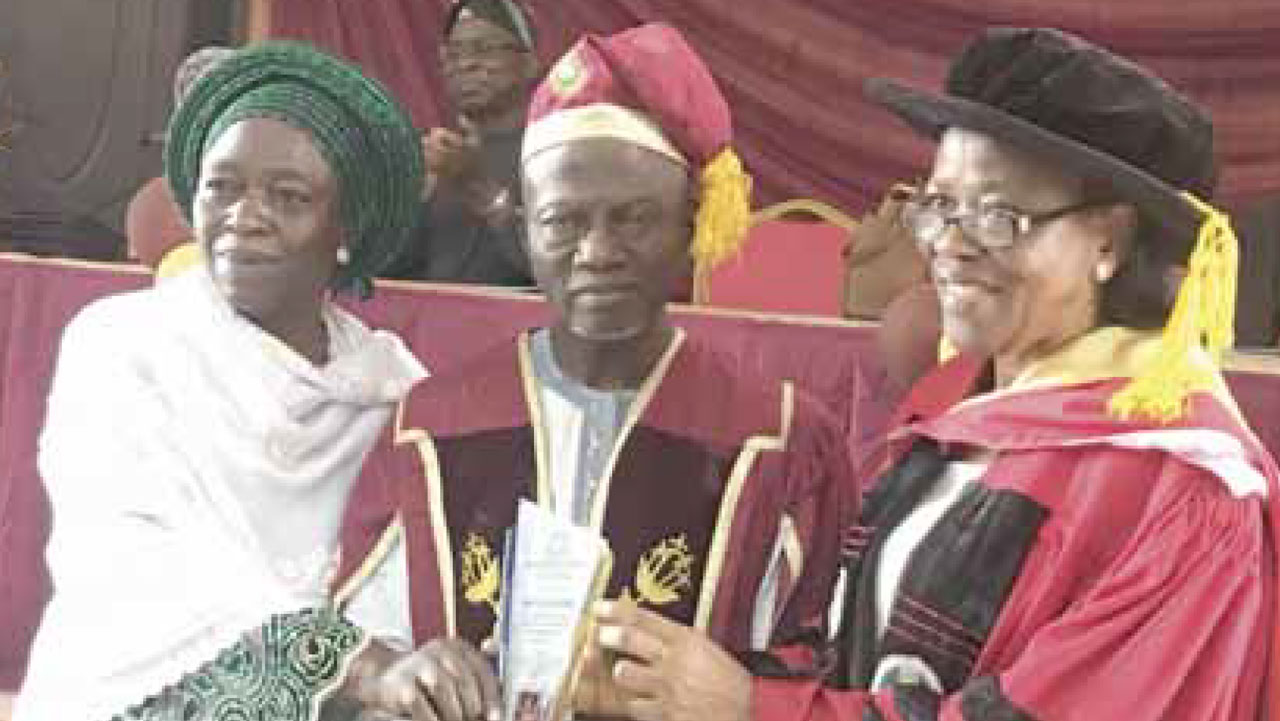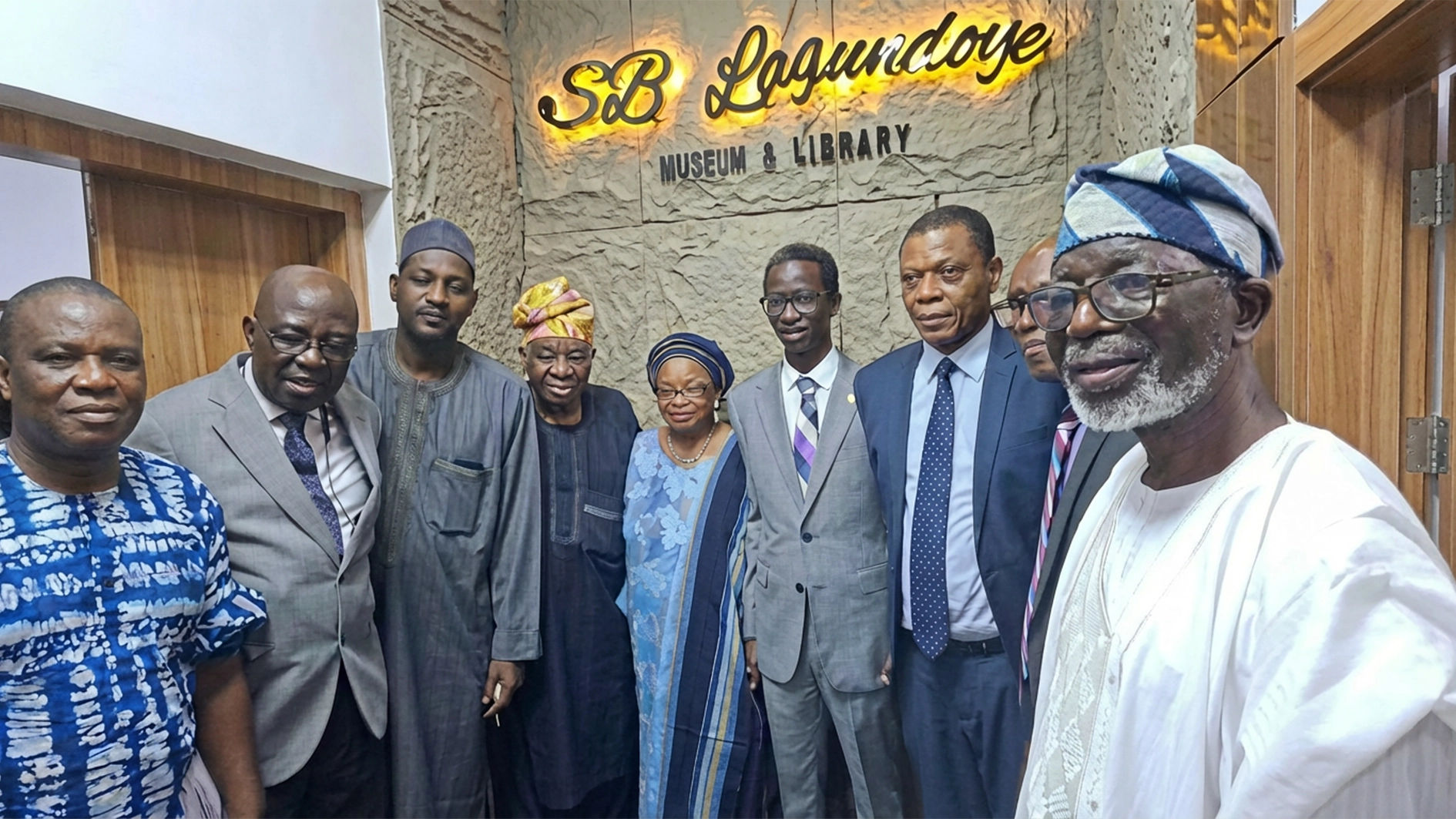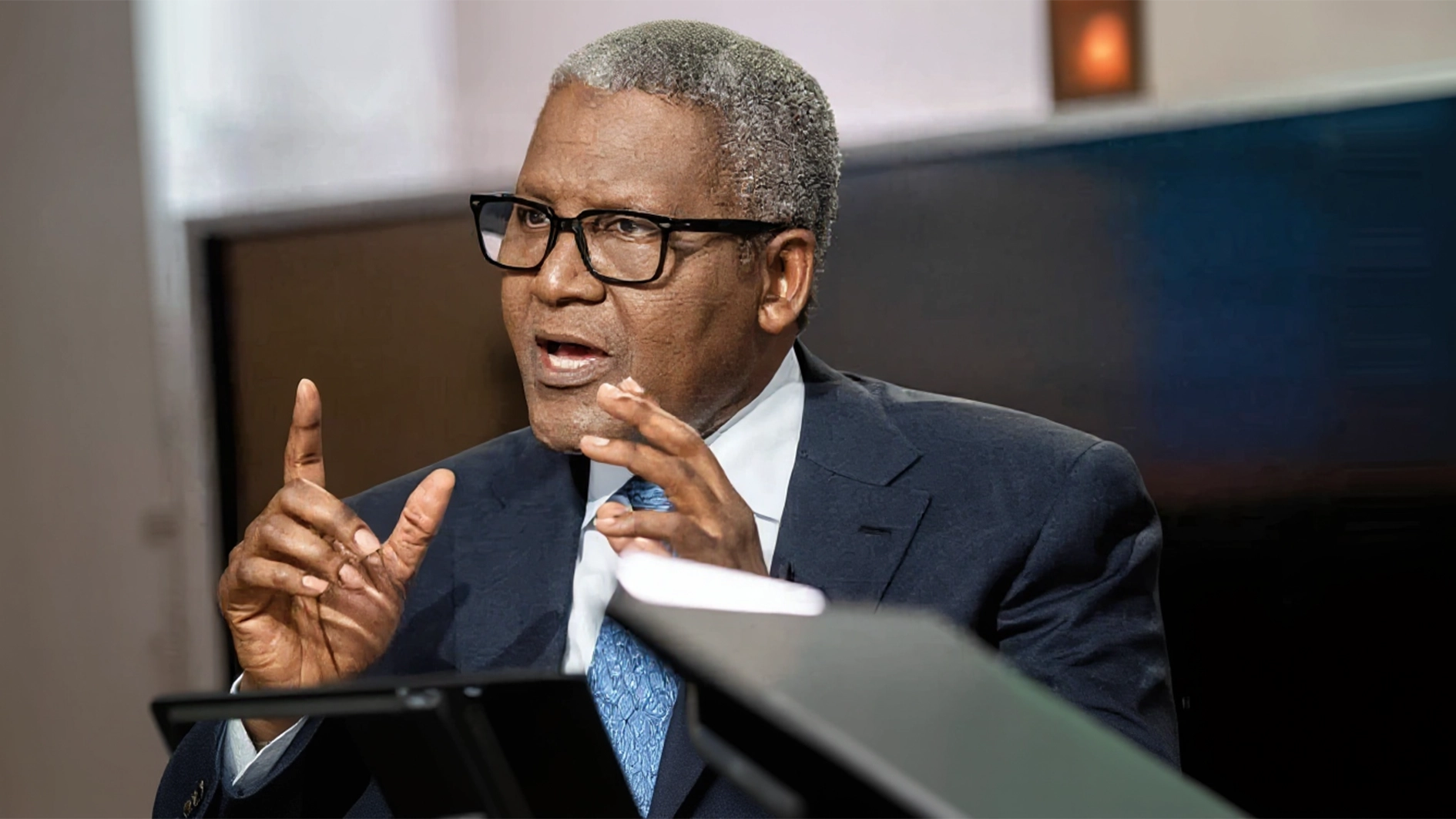
The Valedictory Lecture delivered by former National Commissioner of the Independent National Electoral Commission (INEC), Prof. Lai Olurode, organised in his honour by University of Lagos (UNILAG) as he bowed out of the service of the university, was a gathering of intellectuals.
The event, which had in attendance a former Vice Chancellor of the university, Prof. Rahamon Bello; Alhaja Abimbola Jakande; wife of the honoree, Alhaja Nike Olurode; Akire of Ikire-Ile, Osun State, Oba Abdul Azeez Olatunbosun and Justice Dejo Akanbi and his wife, Adejoke, among other academicians, was held at the Faculty of Social Sciences Lecture Theatre.
The lecture, titled, ‘Knowledge Sector, Public Interest and Power Structure,’ marked Olurode’s formal retirement after over 40 years of lecturing at UNILAG.
He joined the university in 1980 as a graduate assistant. He had his first degree and Master’s degree in Sociology at UNILAG and obtained his Doctorate at the University of Sussex in Brighton, U. K. Olurode was promoted a professor in 2000. He had been head of Sociology and Dean of the Faculty of Social Sciences at UNILAG.
Speaking at the event, Prof. Bello, who served as the chairman, stressed the need for academics to think about the society and proffer solutions to the myriads of problems confronting it.
Bello commended Olurode for practicalising sociology, saying it’s not enough to just teach students without living out what is being taught.
He said: “He practicalised sociology. He didn’t only fix the theory into the students, he gave us an example of what he did with his own immediate family. This should be a lesson to all of us here, and we should be able to draw from that. Whatever we profess in this institution, we should be able to extend it to the community. There is no course that we are into that does not have a value for the society. We must always relate with the society.
“That is the town and gown relationship. You must be able to think about the society in whatever you do and this is why UNILAG is unique in all its circumstances. We want to thank Prof. Olurode for showing those who didn’t know that aspect of life in terms of putting what you do here to practice.”
Bello urged the Head of Department to give the most prominent professor in the department the avenue to teach the newly admitted students the main course in the department.
He said this was essential because it would serve as an opportunity to sustain the interest of the students in the programme and enable them to have an in-depth knowledge of the course.
Bello stressed that this was important for the growth of the students and the university.
“The students that came to speak about him (Prof. Olurode), mentioned the fact that he was able to influence them on the reality of staying in Sociology department during their first contact with him in the course. This is commendable, and every department must learn to give the oldest professor or the most prominent professor the first course to teach in the programme. It is essential because that is how you keep the interests of the students in the programme,” he said.
He described Olurode’s years as a lecturer as fruitful, saying it was a good thing that the department recognised the need to celebrate him.
He added that Olurode proved to be a successful academician, teacher, researcher and a community person that everybody could approach.
“I congratulate Prof. Olurode and Alhaja Olurode as today is your day. This could have happened last November, but it doesn’t matter. The important thing is that your department recognised the need to celebrate you and to showcase you.
“We pray that Almighty Allah will grant you increase in health and the wherewithal that you need for the rest of your life. You have impacted the people and what you have done for the people will reflect on you in your old age. As you grow older, you will not suffer, you will continue to be celebrated for the rest of your life,” Bello added.
Head of the Department of Sociology, Prof. Olufumilayo Bammeke, described Olurode as an honest person who holds himself accountable to very high ethical standards, adding that the celebrant is not far away from his community.
Bammeke, who stressed that Olurode was in tune with the people, said he was always stretching and fighting for the less privileged.
“After spending several decades in the university, the valedictory lecturer is giving an account of his stewardship and service over time, and it also gives us the opportunity to celebrate him. This is somebody who has made remarkable achievements in the University of Lagos. So, it’s a great one.
“The celebrant is a very honest and blunt person. Sometimes he is blunt to a fault. He holds himself accountable to very high ethical standards, and expects everyone around him to live up to that. He doesn’t shy away from letting you know when you disappoint him. He speaks truth to power. He believes a leader should be accountable, because himself was very accountable. You can see the turnout. He is a well-respected and highly esteemed member of the university; somebody who is very honest and hardworking. That’s who he is and we love him for that. So we’re already missing him and we’re going to miss him,” Bammeke said.
She urged Nigerian leaders to imbibe the character of accountability and be empathetic to the pains of the masses.
“Prof. Olurode is not far away from his community. Whether you are talking about the academic community, his religious community or social community, he is in tune with the people. Our leaders should be close to the people, feel the pulse of the people, feel the pain of the people, fight for the people, speak for the people and be the voice of the people. That is what Prof. Olurode does. This is a lot of lessons for leaders,” she added.
On his part, Oba Olatunbosun said the celebrant represents everything that is good, saying aside from being highly knowledgeable, Olurode is at peace with his creator, and serve Him in total submission despite the demands of academic activities.
“By extension, he makes peace with his environment. This eminent personality we are celebrating understands the reality of life. He believes in honesty, justice, equity and fair play, which are the essential ingredients that entrench love among the people and promote peace in the society. Growth, development and progress are achievable only in a society or nation where justice, equity and fair play are imbibed.
“His love for his hometown is huge. Anytime he leaves Lagos to visit his friends and relatives in Iwo, he would buy things like plantain chips, bread and other items not at any other place but Iwo, and by so doing, promoting the businesses of his people. He also patronises Lagosians for his needs when he is around,” Olatunbosun said.
The monarch also commended Olurode’s uncompromising attribute, describing it as one of his weaknesses.
“His other weakness is that he calls a spade, a spade,” he added.
He applauded UNILAG for creating the enabling environment for Olurode to showcase his talents and thrive to reach the peak of his career.
A Professor of Sociology, Oyefara John, described the celebrant as an embodiment of knowledge and good leadership, saying he mentored him on how to handle research projects.
“He taught me how to deliver my lectures. He mentored me to become a good academician. He is a strong individual favoured by God. He has a lot of things that the nation could benefit from. Even administratively, he is knowledgeable on how to handle issues. He is a professor embodied by the grace of God. He is good academically, administratively and in terms of research and implementation. He is a strong person that we all have gained from. I appreciate God for him.
“He was the principal investigator in the first research I had. He has been a great person in project execution. He wouldn’t leave anything out; everything would be done appropriately. He is diligent and approachable,” John said.
A Professor of Jurisprudence and International Law, Akeem Olaniyan, also said he learnt a lot from Olurode.
The Head of the Muslim Community in UNILAG said: Prof. Olurode being the immediate past head of the Muslim community here in UNILAG, I have learnt from him firmness and the principles needed to lead the society. He was very firm and I learnt how to discipline students from him,” he said.
In his lecture, Olurode said Nigerians and their leaders have failed their fatherland because they put more trust in foreign ideas and postulations at the expense of the local intellectual base.
Olurode noted that such could be seen in African nations bowing to the push by foreign powers that youths on the continent should only be trained as clerical officers and that higher education should be taken away from the reach of the majority.
“Unfortunately, African nations that bought such idea and make education unaffordable for their youths are the worst for it. Look at the situation in Nigeria; the government deployed the Integrated Personnel Payroll Information system (IPPIS) in the university system.
Lecturers under the aegis of the Academic Staff Union of Universities (ASUU) said it has come up with the University Transparency and Accountability System (UTAS) but the government sticks to the foreign one, the IPPIS.
“Even if the UTAS has some flaws, why don’t we use it and work on it to perfect it. The hostility of the government to intellectual discourse is uncalled for. Now, if we take access to tertiary education in public institutions away from the children of the masses, the private universities cannot adequately fill the gap.
“Private universities don’t allow for the kind of diversities that public universities offer. Already, we are grappling with the high number of out-of-school children. The bitter truth is that the children that the rich strive to educate may not be able to enjoy life because those who could not go to school would not give them rest of mind,” he stated.
Olurode also lamented that public interest is poorly served in the country, adding that research findings are hardly respected in government circles.
He stated that unless recruited to serve specific interests, academics have limited roles in influencing public policy.
“To push their findings to the front-burners, academics must seek elective or appointive positions, which cost is prohibitive or sidetrack the state, and also get involved in community development via non-governmental organisations (NGOs). By doing the latter, they can deploy their academic training in the service of communities through talk shows on public issues.
“To opt out completely or siddon look (with apologies to Bola Ige of blessed memory) is to live a life of lamentations, which change nothing. Academics should be more creative rather than feel completely despondent or unpatronised,” he added.
He urged scholars to cultivate the friendship of people in power and seek to drive public power with knowledge if public interest is to be served, saying people in power can be cajoled to cultivate friendship of scholars.
Olurode, therefore, called on the Federal Government to work on upholding academic research findings.
He said it had been observed that right from the outset, civilian and military administrations had been uncomfortable with even intellectual discussions on politics.
He frowned on the situation where those who control power do not tolerate the knowledge sector.
According to him, those in power believe that knowledge is subservient to power, rendering the academics completely helpless.
“What is currently obtainable is that power is by far better remunerated than producers of knowledge and public interest is poorly served.
“Research findings are hardly respected in government circles. Unless recruited to serve specific interest, academics have limited roles in influencing public policy.
“Government must begin to reckon with academic research findings to ensure formidable policies are made through such,” Olurode said.






